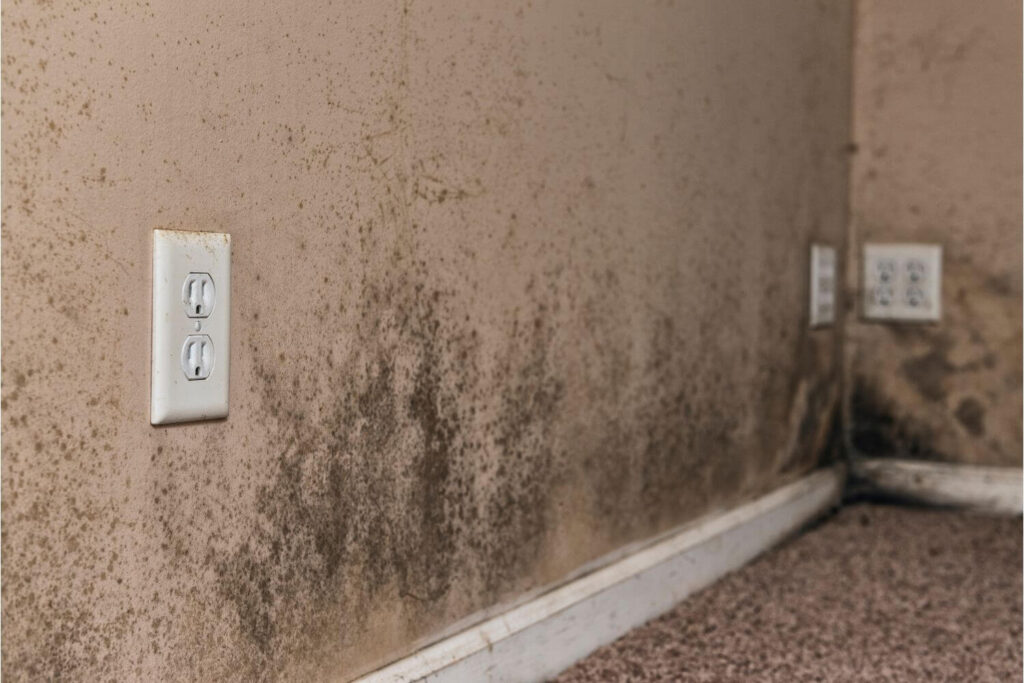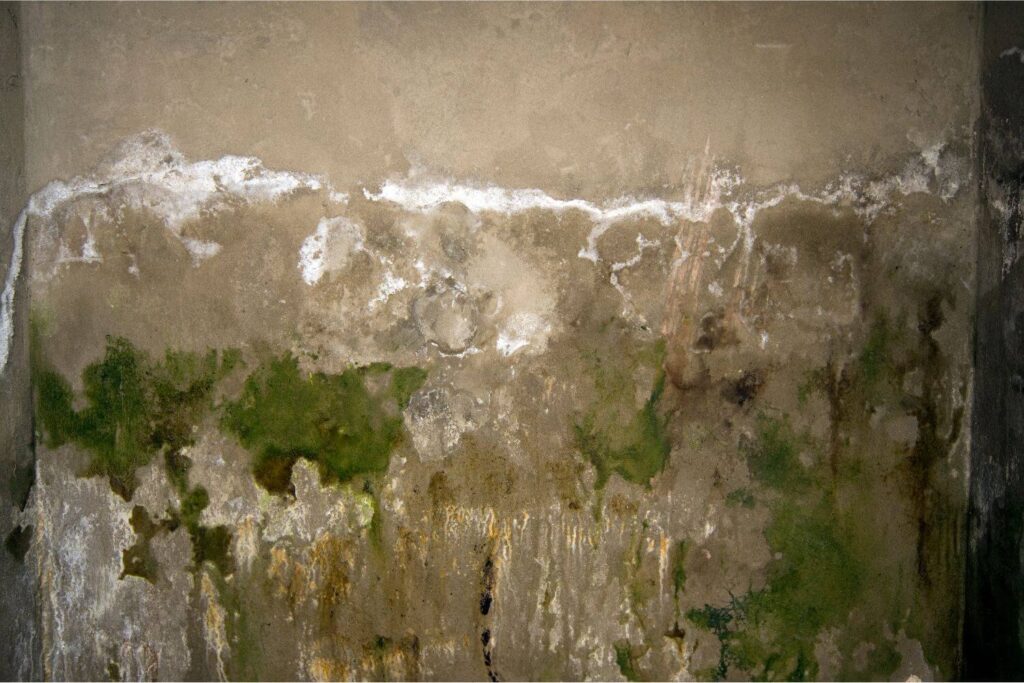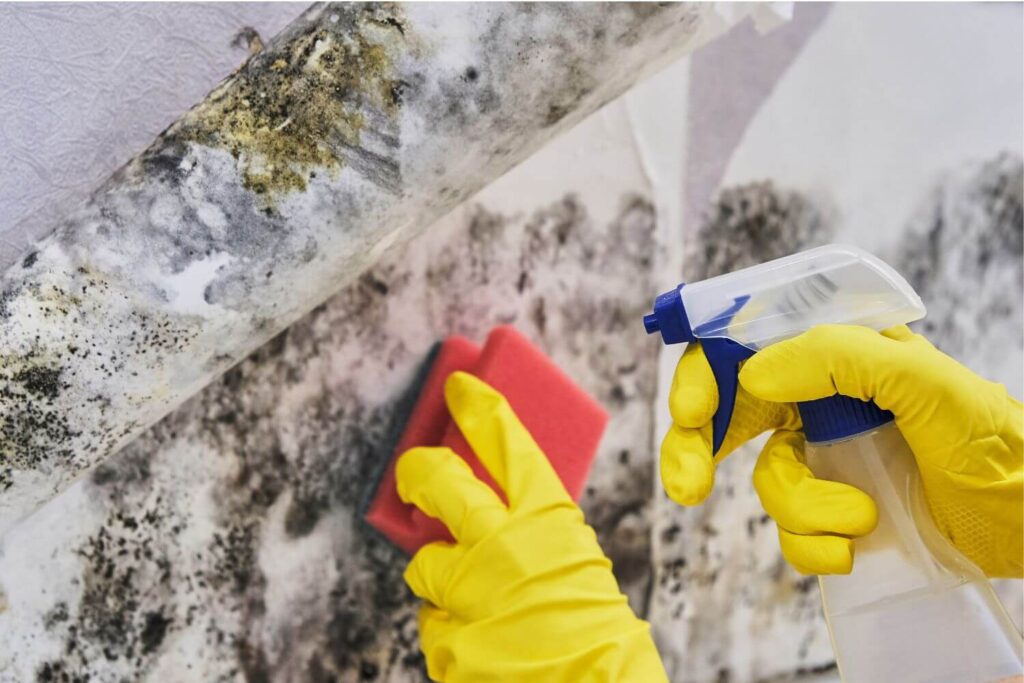There are many types of mold commonly found in basements, and they all have something in common: you don’t want them there. Mold is unsightly, smells bad, damages your property, and can cause health problems that range from bothersome sneezing to potentially deadly nervous and respiratory system conditions. A moldy basement needs immediate professional attention to save yourself, your loved ones, and your property, and your Western Pennsylvania basement waterproofing experts are only a phone call away.
What is Mold?
Mold is a fungal organism that grows on moist organic material in dark, cool places, spreading out via spores. These microscopic spores contain the full code of the parent mold’s DNA, allowing them to grow into entirely new patches genetically identical to the original, each ready to grow and release more spores. Unfortunately, your basement is the perfect place for most types of mold to set up shop.
- Moderate Temperature – Even unfinished basements enjoy the insulating effect of the homes above and the earth around them. This creates an environment that is kept cooler in summer and warmer in winter, often in the prime temperature range for fungal growth and reproduction.
- Plenty of Moisture – Water can enter the basement as vapor rising from the ground, hot, moist air coming from the house above, leaking pipes, or water seeping in through cracks in walls and floors or spaces around pipes. It can accumulate in puddles on the floor, condense on cooler walls and surfaces, or saturate the air, leaving your basement warm and muggy.
- Plentiful Food Sources – Like other fungi, mold feeds on organic material. Upholstery cloth, wallpaper, documents, the wood that frames and supports your home, and some compounds found in grout, stucco, and other building supplies are all ready food sources for some types of mold. As the mold feeds, the integrity of the food source is weakened. Since this is usually accompanied by large amounts of moisture, rot and decomposition can quickly set in, destroying your home and personal property.
- Lack of Airflow – Mold proliferates readily, and still or almost still air allows airborne spores to concentrate, increasing the likelihood of colonies forming on contaminated surfaces. Still air also holds onto more moisture in a single location, increasing the humidity and making the area more hospitable for mold.
- Dimly Lit – In dimly lit spaces, the initial stages of mold growth can look remarkably like shadows or efflorescence, salt deposits left behind by water as it moves through the porous concrete. The longer mold goes unidentified, the more it grows and the harder it gets to eradicate it and repair the damage left behind.
Types of Mold Commonly Found in Basements

There are over a hundred thousand different mold strains, and many can end up in your basement. While some are more dangerous than others, either to you or your property, you don’t want any hanging around, as time and proliferation will turn any strain from a nuisance into a structural or health risk.
Black Mold
Probably the most concerning type of mold is black mold, as so many strains with a black hue represent an immediate health threat. The most common, Stachybotrys chartarum, releases spores that are incredibly toxic to the respiratory system and nervous system. Once they enter the body, they can cause a host of complaints, from trouble breathing to splitting headaches and neuromuscular disorders.
Green, Yellow, and Brown Mold
Green, yellow, and brown are the most common mold colors across all strains, including Trichoderma, Aspergillus, the cotton-like Alternaria, Penicillium, and Cladosporium. However, during their lifecycle, many of these can also appear in black, white, blue, or some mixture of colors. These strains can all cause allergic reactions or respiratory ailments.
White Mold
Many of the above strains can cause white mold, but this color frequently indicates a newer colony that’s early in its lifecycle. It may appear wispy or patchy, a sign that the mold may not have penetrated too deeply into the material it’s feeding on.
Mildew
The terms mildew and mold are sometimes used interchangeably because mildew is a form of mold. Often identified by its smell, mildew is a surface-level colony that is easily cleaned or scraped away as a powder-like substance.
What to Do if You Find Basement Mold
- Make It a Priority – While you may only find a small patch of mold, there is often more of the organism lurking under the surface, and it can spread quickly. It needs to be addressed immediately to remove the mold, clean the area to remove spores, and prevent future mold formation.
- Take Safety Precautions – Wear personal protective equipment (PPE) like ventilator masks, gloves, and disposable aprons or overalls when handling mold. Toxic spores can cause numerous medical issues if breathed in or touched. When possible, open an outside door and use fans to provide ventilation without introducing airborne spores to your home’s interior.
- Use the Right Tools and Chemicals – Choose cleaning chemicals appropriate for mold and mildew eradication. To reduce the risk of contamination, use disposable towels and scrubbing equipment.

- Contact a Mold Removal Pro – Ensuring you completely remove the mold can be tricky, and sometimes that means removing sections of wallboard, moldings, studs, carpet, or flooring. Professional mold mitigation ensures all potentially contaminated materials are removed and that the damage is repaired.
- Basement Waterproofing Helps Prevent All Types of Mold – Professional basement waterproofing helps keep moisture out of the basement and remove moisture that enters quickly through active drainage and dehumidification.
Professional Mold Removal and Basement Waterproofing
We’re Pittsburgh’s mold-removal experts, and our team is ready to help you keep your home, property, and loved ones safe. Schedule a free inspection, and one of our specialists will assess your home’s mold problem, create a mitigation and repair plan that works around your budget and timeline, and talk to you about basement waterproofing options to keep the mold from coming back. We work with all types of mold to restore your home’s integrity and give you back the healthy environment you’ve worked so hard for. Call for your free estimate from A.M. Wall Anchor & Waterproofing today.

